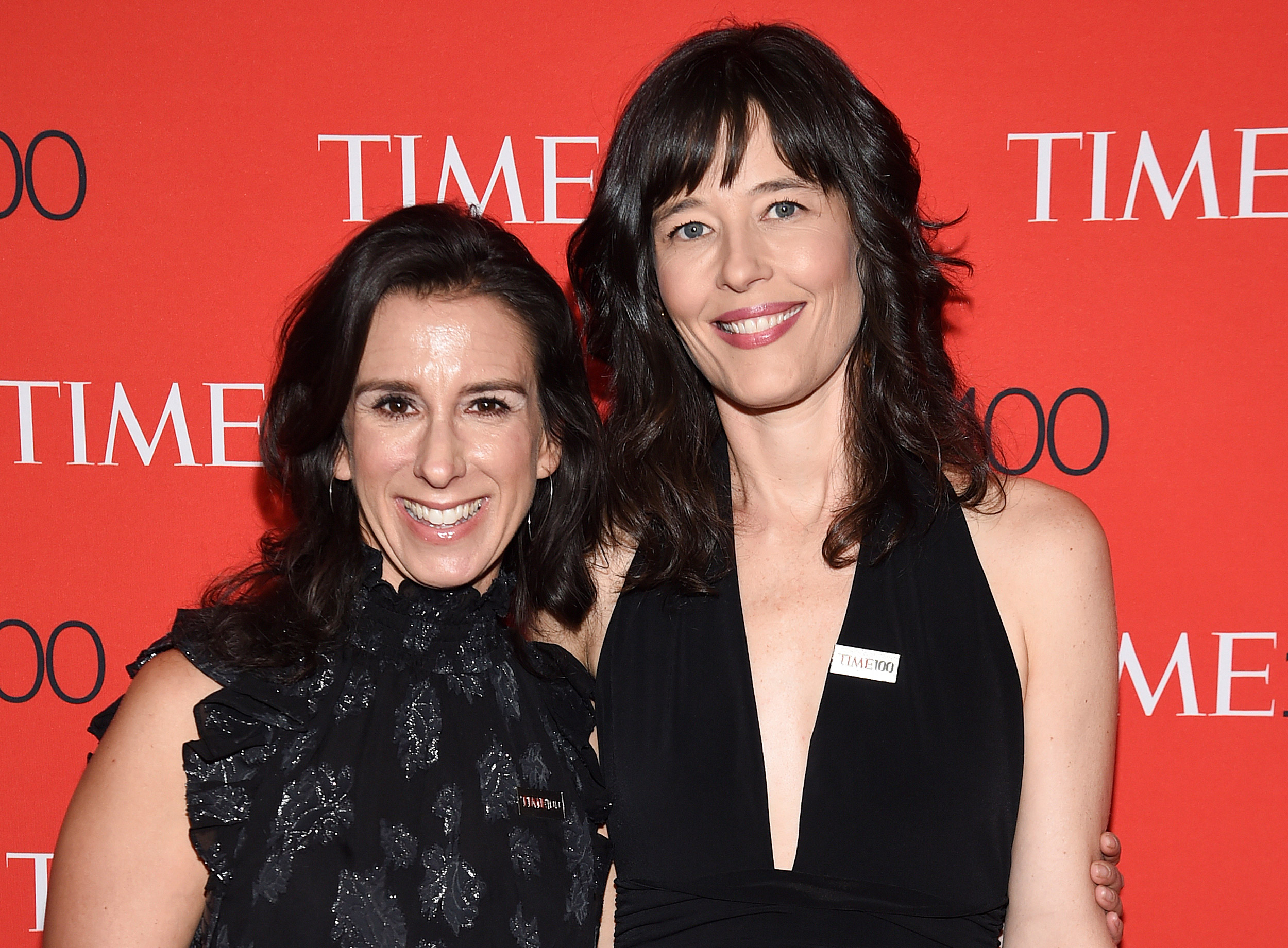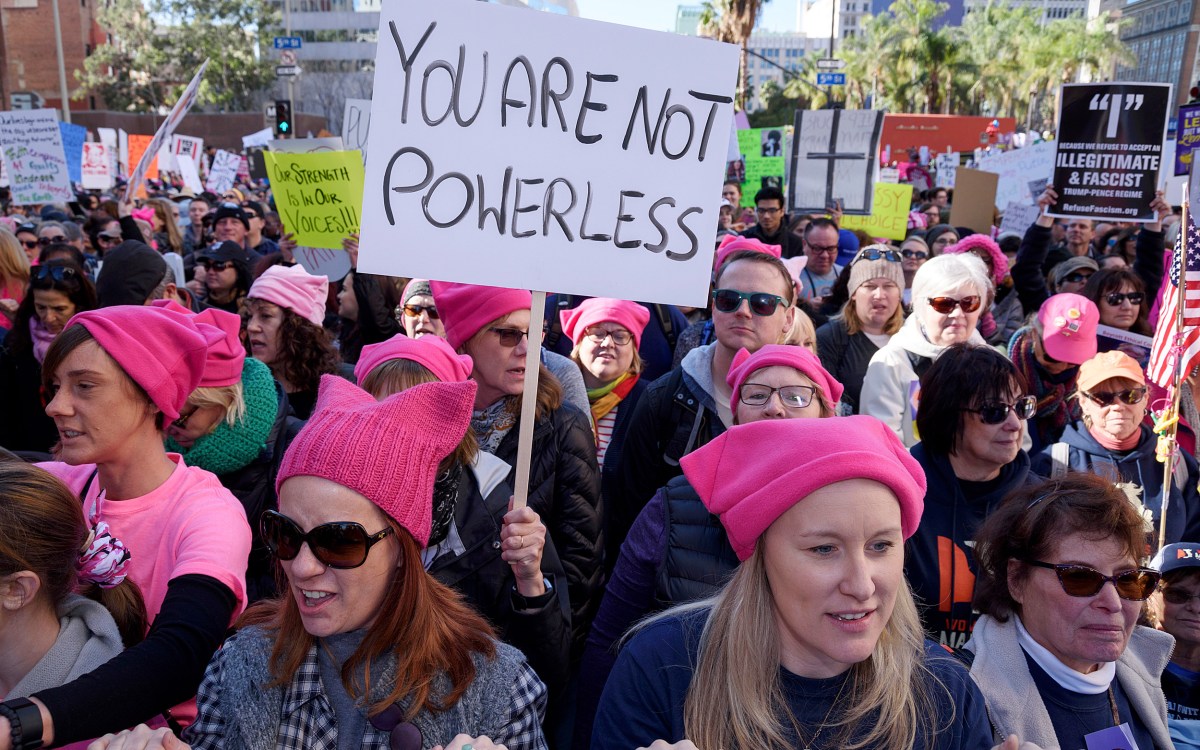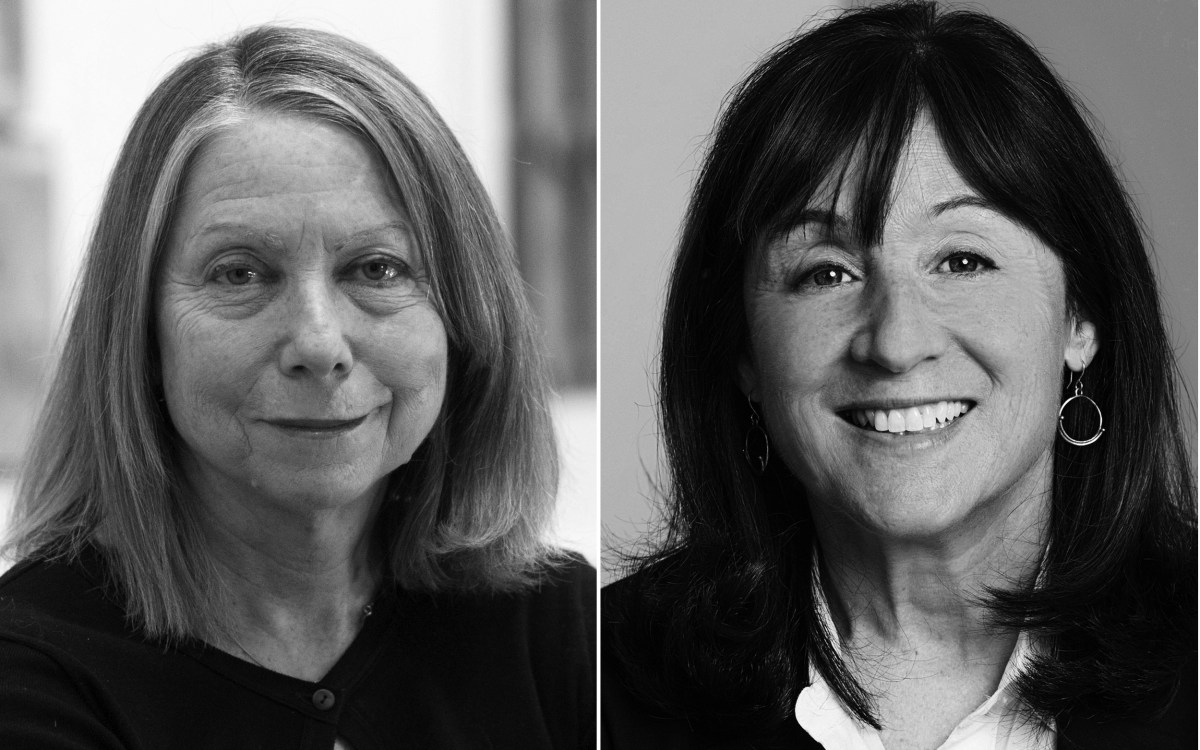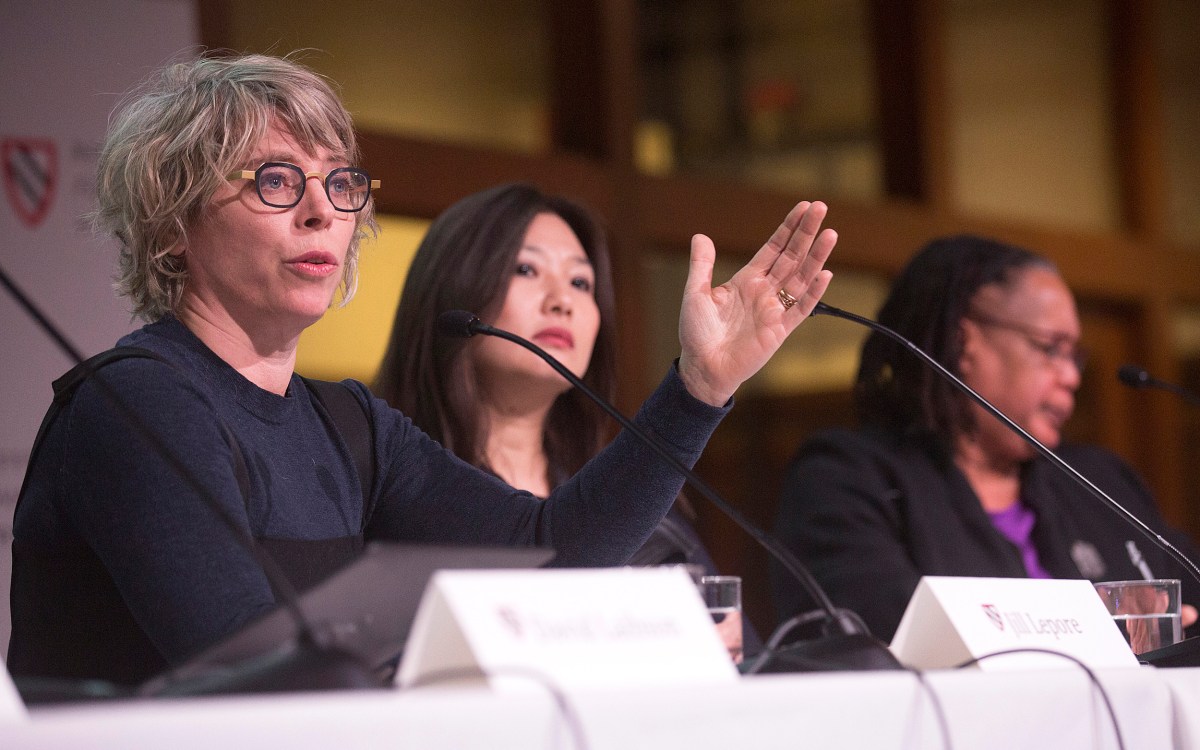
Journalists Jodi Kantor (left) and Megan Twohey in April 2018 at the Time 100 Gala celebrating the 100 most influential people in the world.
Photo by Evan Agostini/Invision/AP
The story behind the Weinstein story
Retracing the path of the two New York Times reporters who did the investigation
New York Times reporters Jodi Kantor and Megan Twohey uncovered scores of rape, sexual assault, and harassment claims against Hollywood mogul Harvey Weinstein that had been kept secret for decades. More than 85 women would eventually come forward to accuse the powerful film producer, including actors Lupita Nyong’o, Angelina Jolie, and Gwyneth Paltrow. Additionally the disclosures prompted thousands of other women to share their own experiences with sexual harassment and assault, igniting the viral #MeToo movement. Kantor and Twohey, who won the Pulitzer Prize for their work, recently published a book, “She Said,” about their investigation and its aftermath.
Kantor, who left Harvard Law School in 1998 after one semester to pursue journalism, recently spoke with the Gazette about the book, and both women will appear with actor Ashley Judd, M.C./M.P.A. ’10, one of the first Weinstein accusers to go public, at a discussion on Oct. 7 at First Parish Church in Cambridge.
Q&A
Jodi Kantor
GAZETTE: The book shows readers how you got the story, all of the deep research and shoe leather required to bring it to light, everything from tracking down the cellphone numbers of celebrities to flying to survivors’ homes to try to talk to them when you were unable to reach them any other way. Why did you feel it was important to share that process?
KANTOR: Once we understood how much these events had come to mean to so many people around the world, we wanted to write a book that would take people behind the scenes and bring readers into this journey, whether it was on those very first tentative phone calls with actresses retelling these Weinstein hotel room stories to journalists for the first time, to the final confrontation with Weinstein here in the offices of The New York Times. We wanted to write an accurate historical record, and we thought there were a lot of surprises in terms of how this actually played out. Obviously, there was a lot that was powerful on the page in terms of the pain that these women had been through, the cover-up that played out over the years. But we also knew that there were a lot of powerful things that had never made it into public light, a lot of things that were off the record, that we couldn’t tell anybody about at the time, and so we wanted to bring that together and share it with other people.
“Once we understood what the pattern of allegations was and how serious and how recent the allegations were, we felt tremendous pressure to get it right.”
GAZETTE: What was it like to be so close to publishing without having any sources go on the record for you, and as you look back now, knowing the dramatic lengths to which Weinstein and his team went to prevent the story from getting out? Were you ever afraid?
KANTOR: It’s true that as the investigation got close to publication the pressure was really mounting, and certainly Weinstein and his team did everything they could to stymie our story. But for us, the pressure and the fear were about two things: One was protecting our sources. The first women to go on the record about Weinstein were so incredibly brave. The very first story has 25 years of allegations against Weinstein going all the way back to 1990, all of which had been hushed up in some way, and so in bringing those forward we were really worried about them facing intimidation or retaliation from Weinstein.
Our second fear was fear of failure. Once we understood what the pattern of allegations was and how serious and how recent the allegations were, we felt tremendous pressure to get it right. We felt we needed to publish; we did not want to live the rest of our lives watching the Oscars year after year knowing these allegations about Weinstein and having to keep them secret. And we also knew that if the first story was botched in any way, things could play out very badly.
GAZETTE: Nondisclosure agreements appear instrumental in silencing accusers and protecting abusers in a lot of sexual harassment and assault cases. And it doesn’t seem like there has been movement to restrict their use. What was the reaction from the women you spoke to who had signed these, and what do you see happening in future?
KANTOR: At the end of the day, this reporting is really not just about one predator or a defined set of victims; it’s really about an entire system and [why] we have seen so many of these horrifying #MeToo cases explode in the last two years and the question of [whether] we have the right tools for preventing and addressing this problem.
One of the big revelations here has been about the role of secret settlements. When we first started reporting on this about two years ago, there were a lot of us at The Times who had covered gender for a long time, and even we did not understand, at that point, that the United States, in effect, has a secret system for muzzling sexual harassment and assault claims.
When many women who have experienced this kind of behavior go to lawyers asking for help, they are asking, in part, for a solution; they want to do something about the problem. And instead, what lawyers often advise them is that their best course of action is a secret settlement. The way secret settlements work is that women are essentially paid hush money to never speak about these experiences. And for a vulnerable woman who has gone through something terrible, this can feel like it makes sense in the moment because you get financial recompense; you get to keep your privacy; you can avoid being branded a tattletale, or a traitor, or a flirt. But what we’ve seen collectively is that these settlements have failed us because they haven’t done anything to actually prevent or address the problem and also, they are very enabling. We were able to show, for example, in our first story that Weinstein gave out at least eight settlements to people over the years starting in 1990. So basically the pattern was that he would pay to silence a woman’s allegations, and then other allegations would crop up a few years later, and there are employees in his company who had no idea that he had previously paid off a woman or women for very similar types of behavior.
GAZETTE: Weinstein had this vast machine across two continents assisting him — people who either actively helped him arrange meetings, helped conceal his behavior, or turned a blind eye to his activities for financial or other reasons. Why did no one speak up sooner?
KANTOR: I think that people made a couple of errors in the way they thought about this. Over the years, a lot of Weinstein’s employees made the decision to classify what they were hearing as the boss’s embarrassing extramarital behavior. They basically made a category error. Instead of saying, “Hey, this is potentially workplace sexual harassment; it sounds like it could be something really serious,” they instead told themselves things like, “Oh, I don’t want to get involved; the boss is sleeping around. This is embarrassing, he’s cheating on his wife. I don’t really want to know about what’s happening.” Which is somewhat understandable, but caused them to miss or gave them an excuse not to address what was happening at the time.
The second thing is that people had this real preconception, this sexist idea that actresses were sluts and that they would do anything for a part. Over and over again, even during our reporting in 2017, people would say things to us like, “They’re desperate; they’ll do anything for a part.” And the casting couch was really an accepted part of Hollywood. People would say things like, “Oh, it’s unfortunate, but it’s always been a part of this business.” But another thing to point out is that part of the reason people didn’t speak out is that Weinstein intimidated people: He threatened them; he used fancy lawyers to silence them; he [used] these secret legal instruments to make sure people didn’t speak up. Women were very afraid of retaliation if they said anything, so there was a real system in place to keep people quiet.
“We wanted to push onward and explore what happened with the #MeToo movement and to acknowledge that things have become very complicated.”
GAZETTE: What prompted such a fierce backlash to the #MeToo movement, and has that made it harder to report on workplace sexual harassment?
KANTOR: We thought that it was really important not to leave the book just with Weinstein. We wanted to push onward and explore what happened with the #MeToo movement and to acknowledge that things have become very complicated. So the last quarter of the book is devoted to what is the first account of what it was like for Christine Blasey Ford to come forward last September. We all watched her public testimony; we have the indelible image of her standing up in that hearing room and telling her story, but what had happened behind the scenes is a much more complicated tale that speaks to the complexity of what’s happened to #MeToo.
In our reporting, what Megan and I see is that there are three questions that are still very hotly debated. One is: What’s the scope of behaviors that are under scrutiny? Are we only talking about classic sexual harassment and assaults, or are we also talking about bad dates or are we also talking about verbal abuse? And also, how far back does the scrutiny go in time? The second question is: How do we get to the bottom of what happened, whether it’s in journalism or whether it’s in an HR process in an office? What are the tools we’re using to make sure we really understand the facts about what happened? And then the third question we see is: What should accountability and punishment look like? Each one of those questions is controversial on its own, but what happens in a lot of these cases is that the questions get combined in a way, they become very intertwined in a way that creates controversy instead of putting it to rest.
GAZETTE: Most of the powerful men in the corporate world credibly accused since the Weinstein story have paid a price. But that isn’t quite the case for many powerful men in politics. If corporate America, reacting to public sentiment, can move swiftly, then why are lawmakers so divided and slow on this issue?
KANTOR: What we have found in our reporting is that politics is the most difficult arena for these kinds of allegations because whatever happens get weaponized. After we broke the Weinstein story, it felt like there was this period where discussion of #MeToo was actually pretty bipartisan. Democrats like [Sen.] Al Franken were accused, but so were Republicans, like [Alabama Judge] Roy Moore. And also, a lot of these stories played out in the corporate arena, which is not particularly political. But the Kavanaugh hearings almost felt in a way like a return to an older pattern, like a return to a pattern that we saw with the allegations against Bill Clinton, Clarence Thomas, and Donald Trump. Those are scenarios in which the allegations take on all of the heat and the poison of American political life. And in those stories, it turns into a holy war very, very quickly and can almost feel like it’s not even about the women anymore.
GAZETTE: Did the toxicity of the Kavanaugh hearings derail the movement or does it potentially undermine future claims?
KANTOR: Part of what’s been so astonishing about the last couple of years is that the #MeToo movement has proven so durable and so self-correcting. I think there was a moment after the Kavanaugh hearings where it all just felt like it had become impossibly politicized, to the point where it was almost preventing constructive conversation. But then we pretty quickly saw a return to so many stories and in so many realms. I remember just a couple weeks after the Kavanaugh hearings, my colleagues at The Times broke this story about Google. Huge amounts of money, millions and millions of dollars, paid to Google employees, one in particular, who had accumulated serious allegations of misbehavior toward women. And the allegations continued to break this summer when Megan and I started to dive into the Jeffrey Epstein allegations. And I think that’s just a reminder about how much we still don’t understand about what’s happened in the past.
Interview has been edited for clarity and condensed for length.








